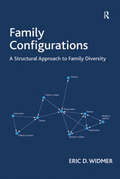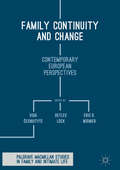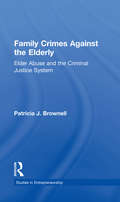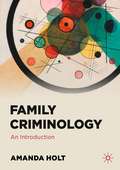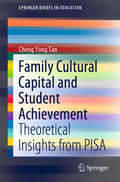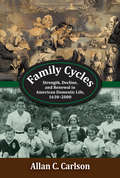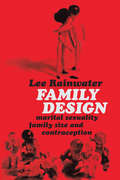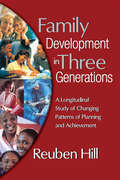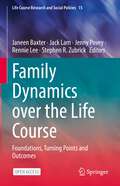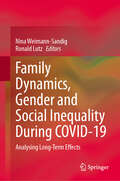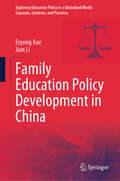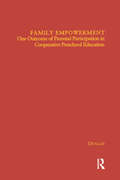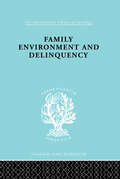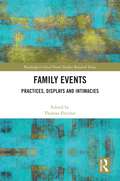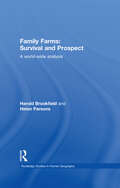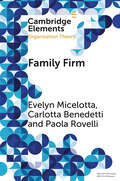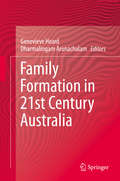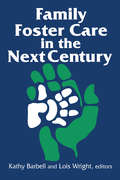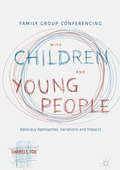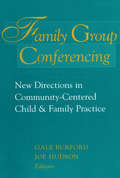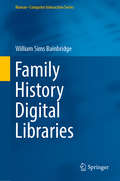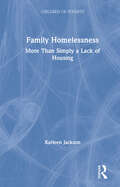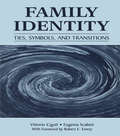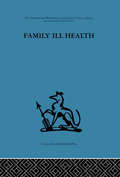- Table View
- List View
Family Configurations: A Structural Approach to Family Diversity
by Eric D. WidmerFamily Configurations develops current scholarship on families and intimate lives by demonstrating that family relationships, far from being fluid and inconsequential, are more structured and committed than ever. Based on a series of empirical studies carried out in the US and Europe, this volume reveals the diversity of family relationships that emerge as a result of various key family issues, emphasizing the supportive and disruptive interdependencies existing among large sets of family members beyond the nuclear family. By applying social network methods to uncover the relational patterns of contemporary families, and making use of rich empirical data, this book draws on recent developments in family sociology, social network analysis and kinship studies to present a fascinating interdisciplinary approach to the family.
Family Continuity and Change
by Eric D. Widmer Vida Česnuitytė Detlev LückThis volume provides readers with recent sociological approaches to family understanding, theorising and practices within the context of continuities and change, both across generations and during individual life courses. The contributors uniquely investigate the friction between persisting family needs and changing circumstances, between holding on to traditional family norms and adapting to fast-changing demands. Authors from nine countries develop and apply innovative theoretical and methodological approaches for a more differentiated description of European family lives at the beginning of the 21st century, and show that family sociology has achieved significant commonalities across national borders in Europe, thus helping our understanding of complex family realities. The book will be essential reading for students and scholars with an interest in family and intimate life, family sociology and policy, sociology and gender studies.
Family Crimes Against the Elderly: Elder Abuse and the Criminal Justice System (Garland Studies on the Elderly in America)
by Patricia J. BrownellFirst Published in 1999. Routledge is an imprint of Taylor & Francis, an informa company.
Family Criminology: An Introduction
by Amanda HoltThis full-colour textbook offers a fresh conceptual approach to understanding the intersections of crime, criminal justice and family life. In doing so, it proposes a brand new sub-discipline of Criminology that places the family at the heart of its analysis, offering a groundbreaking approach to the study of crime and deviance. Adopting an interdisciplinary perspective, this introductory text explores topics from across the spectrum of criminological scholarship, including youth justice, prisons, organized crime, family violence and homicide, and victimology. By drawing together these distinct topics and identifying and discussing their familial connections, this book argues for the importance of family life in the theory and practice of crime and justice. Key questions discussed throughout the text include: How does the criminal justice system engage with families across different contexts? In what ways do crime and criminal justice processes impact on family life? In what ways can families transform the criminal justice system for the betterment of all? This book challenges commonly-held and simplistic assumptions about what the family is in relation to crime and justice and, by doing so, engages in deeper debates about human rights, social justice and the role of the state in relation to families and crime. It includes pedagogic features including conceptual toolboxes, questions for reflection, textboxes, a glossary and interviews with practitioners.
Family Cultural Capital and Student Achievement: Theoretical Insights from PISA (SpringerBriefs in Education)
by Cheng Yong TanThis book focuses on the relationship between cultural capital and student achievement. It fills the gap in the literature on large-scale quantitative studies of the effects of cultural capital. In particular, the review of empirical evidence presented, especially that from studies analyzing large-scale, international data from the Programme for International Student Assessment (PISA), makes a substantial contribution to the literature. This review addresses the knowledge gap on reviews investigating the effects of different forms of cultural capital on student achievement as compared to the more established evidence base in the related field of socioeconomic status.
Family Cycles: Strength, Decline, and Renewal in American Domestic Life, 1630-2000 (Marriage And Family Studies Ser.)
by Allan C. CarlsonIn this paradigm-shifting volume, Allan C. Carlson identifies and examines four distinct cycles of strength or weakness of American family systems. This distinctly American family model includes early and nearly universal marriage, high fertility, close attention to parental responsibilities, complementary gender roles, meaningful intergenerational bonds, and relative stability. Notably, such traits distinguish the "strong" American family system from the "weak" European model (evident since 1700), which involves late marriage, a high proportion of the adult population never married, significantly lower fertility, and more divorces.The author shows that these cycles of strength and weakness have occurred, until recently, in remarkably consistent fifty-year swings in the United States since colonial times. The book's chapters are organized around these 50-year time frames. There have been four family cycles of strength and decline since 1630, each one lasting about one hundred years. The author argues that fluctuations within this cyclical model derive from intellectual, economic, cultural, and religious influences, which he explores in detail, and supports with considerable evidence.
Family Design: Marital Sexuality, Family Size, and Contraception
by Lee RainwaterWhy do contraceptive practices work for some couples and not for others? How do couples decide the number of children they want? What are the implications of family design in terms of the "population explosion?"Family Design is a thoroughly documented study undertaken by Social Research, Inc., for the Planned Parenthood Federation of America. Based on intensive interviews with 409 husbands and wives, it applies the framework of family sociology to a problem that has previously been studied mainly from the demographic point of view.
Family Development in Three Generations: A Longitudinal Study Of Changing Patterns Of Planning And Achievement
by Reuben HillFamily Development in Three Generations is an unusual kind of multi-generational gathering--the result of a massive, in-depth research effort. It is based upon Hill's personal interviews conducted with over 300 families during the course of a year. The discussion results from these interviews, from the statistical information that they produced, and from Hill's consultation with five other fellow researchers. This scholarly contribution to the family field thoroughly analyzes the complexities of the modified generational network. As a multi-generational study, it is pervaded by the vigorous spirit that usually characterizes such research.In his preface to Family Development in Three Generations Reuben Hill invites the reader "to drop in on any generational gathering" where "you will hear how much better or worse life was in grandfather's day than today." Such discussions are usually controversial and center upon shared experiences. Such rhetoric, polemic, and energy sustain conversations among generations.Family Development in Three Generations penetrates to the life center of intimate change in American society. It is a wide-ranging volume that presents varied and highly significant insights into many fields. Scholars will find it a vital contribution to their knowledge of the subject and laymen will find it full of valuable information that they can profitably apply to their own families. The work is widely recognized as a classic in longitudinal analysis of family life.
Family Dynamics over the Life Course: Foundations, Turning Points and Outcomes (Life Course Research and Social Policies #15)
by Janeen Baxter Jenny Povey Jack Lam Rennie Lee Stephen R. ZubrickThis open access book examines how families and other social institutions interact to shape outcomes over the life course. It considers how to use research evidence to reduce social disadvantage through translation of evidence to support public policies and programs. The chapters focus on key life course stages such as early child development, adolescence, emerging adulthood, parenting, marriage, relationships and ageing, as well as examining experiences and outcomes for selected social groups such as Indigenous children, migrants and refugees, and gay, lesbian and bisexual groups. The book presents evidence using high-quality and recent data. With a focus on Australia, the volume provides new insights into how context shapes life course pathways and outcomes and a contrast to work that typically focuses on Europe and the United States. It will be of value to anyone interested in understanding how family background and life course pathways influence social disadvantage.
Family Dynamics, Gender and Social Inequality During COVID-19: Analysing Long-Term Effects
by Ronald Lutz Nina Weimann-SandigThis book critically analyzes both the negative and positive impacts of the Coronavirus pandemic, focusing on changes in families, gender developments, and the evolution of social inequality structures. The Corona pandemic, with its unprecedented restrictions on contact, has meant that families have been challenged in their functioning in a very special way. International studies show that socioeconomic factors such as education, income, but also the geographic center of life of families and women in particular, had an important influence on the management of the pandemic. Despite all negative side effects of the Corona pandemic, there were nevertheless also innovative impulses, especially in the field of social work, particularly work with families. The book's 18 chapters, organized in six sections, highlight not only short-term changes but also longer-term developments that either require a corresponding concept of measures or action or can be evaluated as drivers of innovation in the pandemic. Part I: IntroductionPart II: Family DynamicsPart III: Child Well-being Part IV: Social Work with Children and FamiliesPart V: Gender and COVID-19Part VI: Conclusion The special feature of the volume is its global perspective. Authors from different countries describe changes and developments on these topics and make clear what profound effects the pandemic had on families, social inequality structures, and gender-specific situations. The anthology does not comprehensively reflect international perspectives. Rather, it leaves it up to readers to compare the developments in the respective countries with their own country of origin from a comparative cultural perspective. In this way, ideas for future, overarching research projects may be stimulated.Family Dynamics, Gender and Social Inequality During COVID-19 is timely and relevant reading for scientists, students, and practitioners in sociology, social work, and political science.
Family Education Policy Development in China (Exploring Education Policy in a Globalized World: Concepts, Contexts, and Practices)
by Jian Li Eryong XueThis book provides a comprehensive overview of family education policy development in China. Each chapter draws upon existing literature, reviews the policy text and implementation data, identifies the challenges of and problems in the policy implementation process, and proposes corresponding countermeasures and solutions. It examines a wide range of education policies in China, including the management policy of family education organization, family education resource allocation policy, family education guidance service policy, the educational policy on the parent-school cooperation, school support-based family education policy, community support-based family education policy, family education monitoring and evaluation policy, and family education responsibility sharing policy.
Family Empowerment: One Outcome of Parental Participation in Cooperative Preschool Education (Children of Poverty)
by Katherine DunlapFirst published in 2000. Routledge is an imprint of Taylor & Francis, an informa company. Positive effects of preschool education on children have been well documented (Berrueta-Clement et al., 1984; Consortium for Longitudinal Studies, 1983, Deutsch, Jordan, & Deutsch, 1985; Lazar & Darlington, 1982). This study considers positive benefits for caregivers who participate in cooperative preschool education. Since not all caregivers are parents, the study includes grandparents who have custody of children, and kin with responsibility for kith.
Family Environment and Delinquency (International Library of Sociology #Vol. 144)
by Eleanor Glueck Sheldon GlueckThe International Library of Sociology (ILS) is the most important series of books on sociology ever published. Founded in the 1940s by Karl Mannheim, the series became the forum for pioneering research and theory, marked by comparative approaches and analysis of new disciplines, such as the sociology of youth and culture. Spanning volumes by Parsons, Dickinson and Ossowski, the history of the ILS is the history of modern sociology.
Family Estrangement: A matter of perspective
by Kylie AglliasFamily estrangement is larger than conflict and more complicated than betrayal. It is entwined in contradictory beliefs, values, behaviours and goals and is the result of at least one member of the family considering reconciliation impossible and/or undesirable. The cessation of familial relations, whether that involves rejection or deciding to leave, can be an inordinately traumatising experience. Whilst data suggests that around 1 in 12 people are estranged from at least one family member this topic is rarely discussed or researched. Based on the author’s in-depth research and exploration of the topic of estrangement, Family Estrangement: A Matter of Perspective captures the unique lived experiences of both estrangee and estranger. Offering multiple perspectives drawn from academic and popular literature as well as case studies, the book contextualises its chapters within current theoretical understandings of family relationships and estrangement, including Loss and Grief theories, Attachment Theory and Bowen Family Systems Theory. Practice sections provide estranged readers and professionals with a structured approach to exploring the various aspects of estrangement within a family and to help them identify resilience, strengths and strategies which individuals may harness as they attempt to live with estrangement. Written with the aim to provide guidance in understanding estrangement in context, this book is suitable for estranged family members and all professionals who encounter and work with people affected by estrangement, including social workers, counsellors, psychologists, allied health professionals, doctors, nurses and legal professions.
Family Events: Practices, Displays and Intimacies (Routledge Critical Event Studies Research Series.)
by Thomas FletcherAn unprecedented exploration of the intersection of events and family studies, Family Events uses events as a lens through which to explore the concepts of families, family practices, family displays and family intimacies. Family Events explores the idea that how families come to be and moreover, come to be defined as ‘families’ relies on events; whether that be via ‘family events’ – those which serve to celebrate being part of ‘my’ family – (e.g., birthdays, weddings, funerals), ‘events experienced as a family’ (e.g., a holiday or day trip), or ‘events which impact families’ (e.g., recession, war, global health emergency). Family Events brings together contributions from the social sciences, leisure and event studies which focus on a variety of different event contexts, including the life cycle, death and illness, sport, holidays and community and religious festivals. Family Events offers a multitude of insightful perspectives on the intersection of events and family studies and is a valuable resource for academics and students with a research interest in events, leisure and the family.
Family Farms: A World-Wide Analysis (Routledge Studies in Human Geography #Vol. 20)
by Harold Brookfield Helen ParsonsMarx, Lenin and Kautsky all regarded family farming as doomed to be split into capitalist farms and proletarian labour. Most modern economists regard family farming as an archaic form of production organization, destined to give way to agribusiness. Family Farms refutes these notions and analyses the manner in which family farmers have been able to operate with success in both developed and developing countries, using examples wherever these are illuminating. This book begins by reviewing theoretical arguments about agricultural structures, and defines family farming. This is followed by five vignettes about farming in the first half of the twentieth century. The authors analyse the conditions of access to land and water, labour, livestock, tools and seed and review marketing arrangements and how they have changed since 1900. A three-chapter review of evolving policies in the North Atlantic countries, in the communist states, and in the developing countries, leads to a discussion of the impact of neo-liberalism. New issues of the farmer as steward of the environment are explored, as well as modern ideas about de-agrarianization and a discussion of land reform, tracing the experience of Mexico and Brazil. In two final chapters the more positive approach of pluriactivity is discussed and followed by a review of organic farming as a principal modern innovation. New political organizations representing family farming are described and their demands are discussed with empathy, but in a sceptical manner. Family farming is an adaptable and resilient form of production organization, and these qualities have allowed it to survive. The future will be no easier than the past, yet family farming continues to flourish in most contexts. This book will be useful for researchers, students and lecturers interested in Development Studies, Rural Studies and Geography and Anthropology, as well as general readers who have an interest in farming.
Family Firm: A Distinctive Form of Organization (Elements in Organization Theory)
by Evelyn Micelotta Carlotta Benedetti Paola RovelliThis Element reinvigorates calls to explore avenues to further integrate the research fields of Organization Theory (OT) and Family Business (FB). It presents the family business literature in management journals and categorizes these papers based on four types of theoretical contribution: Embedded, Integrative, Challenger and Generalized. It discusses opportunities for dialogue between FB and OT for each type in three research domains: (i) managing hybridity, (ii) mastering tensions, dualities, and paradoxes, and (iii) modelling time and temporality.
Family Formation in 21st Century Australia
by Genevieve Heard Dharmalingam ArunachalamThis book provides a detailed, up-to-date snapshot of Australian family formation, answering such questions as 'what do our families look like?' and 'how have they come to be this way?' The book applies sociological insights to a broad range of demographic trends, painting a comprehensive picture of the changing ways in which Australians are creating families. The first contemporary volume on the subject, Family Formation in 21st Century Australia chronicles significant changes in partnering and fertility. In the late 20th century, cohabitation, divorce and births outside marriage rose dramatically. Yet family formation patterns continue to evolve, requiring fresh analysis. Even since the turn of the century, divorce has stabilized and fertility has increased. Using information from the 2011 Australian Census and from large-scale surveys, leading Australian academics dissect recent trends in cohabitation, 'living apart together', marriage, interethnic partnering, relationship dissolution, repartnering, contraceptive use and fertility. Since there is more diversity in family formation patterns than ever before, the book also considers differences between groups within the Australian population. Which groups are more likely to marry, cohabit or have higher fertility? And how do patterns differ among indigenous, migrant or same sex attracted Australians?.
Family Foster Care in the Next Century
by Lois Wright Kathy BarbellFamily foster care is supposed to provide temporary protection and nurturing for children experiencing maltreatment. Although it has long been a critical service for millions of children in the United States, the increased attention given to this service in the last two decades has focused more on its inability to achieve its intended outcomes than on its successes. However, as social and political trends and new legislation reshape child welfare, policymakers and service providers continue to offer innovative policy and practice options for this child welfare service. Though use of the service has changed, family foster care remains important. Responding to a widespread sense of the "drifting" of children in care, Congress passed the Adoption Assistance and Child Welfare Act of 1980. This legislation became a key factor shaping the current status of family foster care. Its goal was to reduce reliance on out-of-home care and encourage use of preventive and reunification services; it also mandated that agencies engage in planning efforts for permanent solutions for foster children. Yet, despite federal mandates and funding, the child welfare system has continued to struggle to provide the level of services needed for children to reduce the amount of time children remain in temporary foster care. The latest response to these problems, the Adoption and Safe Families Act of 1997, established unequivocally that safety, permanency, and well-being were national goals for children in the child welfare system. To comply with the law, public and private agencies are required to initiate significant program and practice changes in the coming years to improve permanency outcomes and child well-being in family foster care. The central theme of the volume is accountability for outcomes, certainly a current driving force in child welfare as well as in other public and private service fields. This volume will be of interest to all concerned with the social welfare of children and families at the end of the twentieth century. Kathy Barbell is director of Foster Care of the Child Welfare League of America, Washington, DC. Lois Wright is assistant dean at the College of Social Work, University of South Carolina, Columbia.
Family Group Conferencing with Children and Young People
by Darrell FoxFamily Group Conferences are seen as a progressive and influential form of practice in child welfare across the globe. This book examines and identifies variations in independent advocacy provision offered to young people and their families in relation to undertaking a FGC, and discusses how these can impact the outcomes both positively and negatively for young people involved. Using critical discourse analysis and an original theoretical framework, the outcomes of advocacy provision are examined from participants' perspectives prior to, during, and after the FGC process has been completed. The analysis develops themes that are discussed comprehensively and recommendations are made for the enhancement of advocacy provision generally, and, for young people involved in FGC specifically.
Family Group Conferencing: New Directions in Community-Centered Child and Family Practice
by Gale BurfordFamily Group Conferencing indicates a large-scale shift in assumptions about the way child welfare services are planned and delivered - away from models that emphasize pathology, and toward those seeking an ecological understanding of the families and social networks involved. The contributors also present a wealth of information on related approaches, such as community conferences, circles, and wraparound services. The British Journal of Social Work noted that 'there are issues relating to both process and outcome. This book offers some answers that are intelligent and passionate.'
Family History Digital Libraries
by William Sims BainbridgeIn the modern era, every family and local community can cultivate its own history, endowing living people with meanings inherited from the people of the past, by means of today’s computer-based information and communication technologies. A new profession is emerging, family historians, serving the wider public by assisting in collection and analysis of fascinating data, by teaching talented amateur historians, and by producing complete narratives. Essential are the skills and technologies required to preserve and connect photos, movies, videos, diaries, memoirs, correspondence, artefacts and even architecture such as homes. Online genealogical services are well established sources of official government records, but usually not for recent decades, and not covering the valuable records of legal, medical, and religious organizations. Information can be shared and interpreted by family members through oral history interviews, social media, and online private archives such as wikis and shared file depositories. This book explores a wide variety of online information sources and achieves coherence by documenting and interpreting the history of a particular extended American family on the basis of 9 decades of movies and videos, 17 decades of photographs, and centuries of documents. Starting now, any family may begin to preserve their current experiences for the historians of the future, but this will require social as well as technical innovations. This book is the essential resource, providing the fundamental principles, effective methods, and fascinating questions required to make our past live again.
Family Homelessness: More Than Simply a Lack of Housing
by Karleen JacksonFirst published in 2000. This book examines the multiple factors which contribute to family homelessness, and uses quantitative and qualitative analyses to identify those factors which represent the major supports and barriers to homeless exit and housing stability. Results show that while family homelessness is not caused by a single issue (but a combination of issues including alcohol/substance abuse, untreated mental illness, domestic violence, family configuration, lack of community or social supports, and/or lack of affordable housing options) community and social supports provide the single most significant impact on the ability of families to exit homelessness and maintain stable housing. Quantitative data suggests that investing in community/social supports for homeless families could facilitate their exit from homelessness and increase housing stability for families at risk, while reducing those supports might increase homelessness. Qualitative data indicates that supportive relationships are instrumental to understanding that while homelessness is a terrible experience, those who experience homelessness are not terrible people. Furthermore, recognizing that a loss of housing does not necessarily mean the loss of one's symbolic representation of 'home' could assist families in viewing homelessness as a transformational learning experience rather than a traumatic failure.
Family Identity: Ties, Symbols, and Transitions
by Eugenia Scabini Vittorio CigoliGender, generations, and lineage; faith, hope, and justice; gifts, duties, and debts; affection, responsibility, and generativity; values, secrets, and objectives; transmissions and transitions: these are the primary themes of family. They refer to what the family relationship builds in terms of organizational structure, motives, and objectives. Family assumes different forms and attire according to culture and the passage of time, but there are seeds that pass constantly through the millstone of family relationships and make up its identity.Family Identity: Ties, Symbols, and Transitions is the fruit of many years of research, and of the fertile exchanges with researchers all over the world, through personal contact as well as through their writings. The aim of this volume is to bring into focus all the many themes that help to construct family identity. It provides a conceptualization of the family that is both fresh and traditional.This book will appeal to researchers and students in family studies, developmental psychology, social psychology, and clinical psychology.
Family Ill Health: An investigation in general practice
by Robert KellnerTavistock Press was established as a co-operative venture between the Tavistock Institute and Routledge & Kegan Paul (RKP) in the 1950s to produce a series of major contributions across the social sciences. This volume is part of a 2001 reissue of a selection of those important works which have since gone out of print, or are difficult to locate. Published by Routledge, 112 volumes in total are being brought together under the name The International Behavioural and Social Sciences Library: Classics from the Tavistock Press. Reproduced here in facsimile, this volume was originally published in 1963 and is available individually. The collection is also available in a number of themed mini-sets of between 5 and 13 volumes, or as a complete collection.
